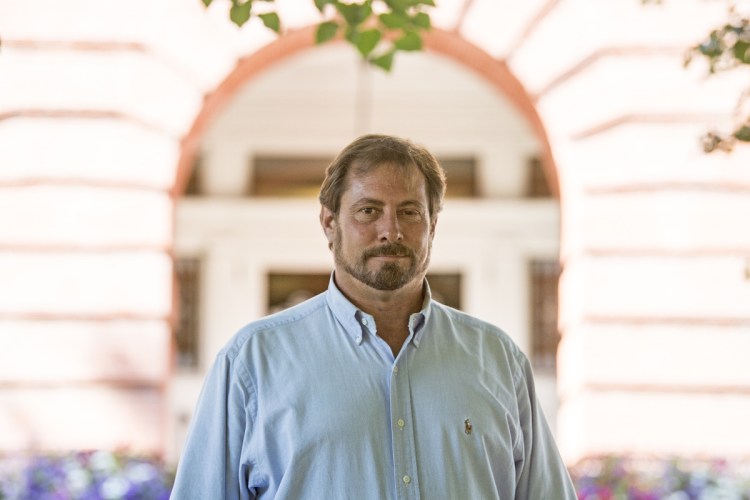WATERVILLE — Republican leaders are remaining largely mum on their qualified Clean Elections candidates who have yet to receive their funding.
Mark Andre, the Republican candidate for Maine House District 110, claims he was denied his $5,075 unfairly after he qualified as a Clean Elections candidate. Andre, who claimed it is not right that his Democratic opponent, Colleen Madigan, already has received the funding, is planning to lend himself the funds until money from the Maine Clean Elections Act is given to him. However, he has been told he is not allowed to do that, as even a loan from himself is considered a private donation.
The recount of the Republican primary vote for House District 110 — which Andre won — delayed the date on which he was declared the winner and left Andre without the money he should have received from the previous year’s budget. The recount occurred close to the end of June, and as of July 1, the state has been unable to make payments for Clean Elections, as a typographical error in the biennial budget reduced the funding available.
According to a letter from Jonathan Wayne, executive director of Maine’s Commission on Governmental Ethics and Election Practices, as of July 1 the commission has been “prevented from making any payments from the Maine Clean Election Fund … for non-personnel purposes.” The letter is directed to Sen. Roger Katz, R-Augusta, whom Andre contacted for assistance. Wayne said this is because of an unintentional decision by the Legislature that reduced the commission’s spending authority by $3 million.
Andre is not the only candidate affected by this. Wayne said Kathy Javner, the Republican candidate in House District 141, which includes large rural sections of Washington and Penobscot counties, also was affected. Wayne said 128 candidates who qualified for supplemental payments, a higher form of support, also have been left without funding.
“The commission is hopeful the Legislature will be providing us with the authority to make those payments,” Wayne said in an interview.
Although a date has yet to be set for the Legislature to reconvene, Wayne said he was hopeful lawmakers would readjust the budget to allow them to pay candidates. The Ethics Commission will meet on Wednesday, however, when Wayne will discuss the issues with its members.
Rep. Ken Fredette, the House Republican leader, could not be reached for comment.
Rep. Ellie Espling, the assistant House Republican leader, was out of the state and unavailable for comment.
Lauren LePage, the chairwoman of the dormant Waterville Republican Party committee, did not want to comment on Andre’s position. LePage is also the spokesperson for Shawn Moody, the Republican nominee for governor. She said Moody did not want to weigh in on the issue. Moody himself is not a Clean Elections candidate.
Representatives from the Maine Republican Party did not respond to requests for comment and had not issued any kind of statement on the issue on social media or in a news release.
In a letter to Wayne, Katz, a Republican representing Senate District 15, suggested Andre be given his MCE funds.
“I am well aware of the current mess in which we find ourselves regarding Clean Elections funding, but Mark Andre is the certified nominee for the November election, he long ago qualified for Clean Elections funding status, and he is entitled to the same Clean Elections funding as every other candidate,” Katz wrote.
Waterville Mayor Nick Isgro also weighed in on the denial.
“What the MCEA has don (sic) in Mr. Andre’s case is as unforunate (sic) as it is unfair. I have had the opportunity to discuss the campaign with Mr. Andre and the issues he intends to raise stand to benefit our entire city and all residents regardless of party. Denying him the funding necessary to run an effective campaign would be a great disservice to the City of Waterville,” he said via email.
In email exchanges between Wayne and Andre, provided to the Morning Sentinel, Wayne urges Andre to remain patient and advises against Andre lending himself the $5,075 while waiting for the commission to pay him. As a Clean Elections candidate, Andre is ineligible to accept donations, and Andre lending himself the money would be viewed as a private donation, a violation.
“Because it is a violation of the Maine Clean Election Act for a certified candidate to accept a contribution (including a loan), I am in no position to authorize you to lend your campaign money,” Wayne wrote to Andre. “If I could direct the State to issue a payment to you, I would. As of right now, it is in the hands of the Legislature.”
Wayne also advised Andre to call party leaders Fredette and Espling, though Andre has said it’s not appropriate for him to lobby for the Ethics Commission.
“The fact that you cannot provide the appropriate funding levels to my campaign means your department and the State of Maine are in violation of the conditions of the MCEA, not my campaign,” Andre responded to Wayne. “I will not allow the political machinations in Augusta, which may drag on for weeks, to further impact my campaign. The loan that will be drafted will contain specific provisions that insure when MCEA funds become available, the full value of the loan will be repatriated and we will maintain and provide your department with the records necessary to show that we have neither accepted nor spent a penny more than the amounts specified in the MCEA rules. My only intention is to comply with the terms of MCEA.”
The Clean Elections Act, established in 1996, is a voluntary program that fully finances qualified individuals running for governor or the Legislature. To qualify, candidates must collect a minimum number of checks or money orders of $5 or more made payable to the Maine Clean Election Fund. Once the candidate qualifies, he or she cannot accept private contributions.
Colin Ellis — 861-9253
cellis@centralmaine.com
Twitter: @colinoellis
Send questions/comments to the editors.


